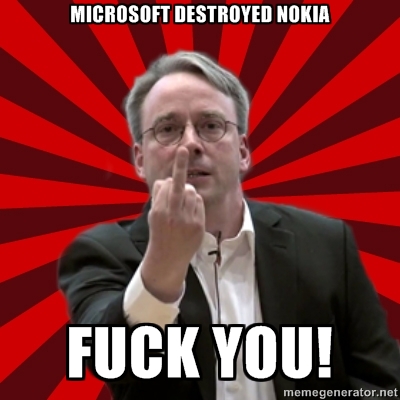06.19.12
Links 19/6/2012: Mandriva Linux 2012 Tech Preview, Linus’ Remarks, Dell Helps Ubuntu, Wine 1.4.1 Released
![]()
Contents
GNU/Linux
-
FREE Issue of Linux Journal Available Today
-
These Are The Biggest Problems With Linux
-
These Are The Biggest Blessings With GNU/Linux
Once again a supposed fan of FLOSS trumpets an attack-piece listing the many flaws of GNU/Linux while completely getting it wrong. The first item, hardware support, for instance, is clearly wrong. GNU/Linux supports far more hardware out of the box than that other OS. That you can move a disc-image from one random machine to another and get it working instantly is proof of that. That’s almost impossible with that other OS.
-
So, you want to learn Linux?
I have occasionally caught myself talking to them like a Grandpa talking to his grandkids about walking to school…uphill…bothways…in the snow. Why? When I first loaded Linux things were very different. Sure, it was a lot easier when I started (about 11-12 years ago) than in the really early days of distributions like SLS. My first distro was Red Hat 7 (the *original* Red Hat before the Fedora Project). Even though some things were less magically auto-configuring as they are now, it was still pretty easy to install and use for someone who was already a Windows and Macintosh ‘power-user’. It wasn’t until I got ‘bored’ with Red Hat/Fedora and moved on to Slackware did I really learn about Linux.
-
Linux on the test drive
Why should a Linux Live run be any different from the test drive of a new car?
-
Desktop
-
Dell To Sell Ubuntu PCs At Retail In India
Dell will sell Ubuntu pre-loaded PCs in 850 retail outlets in India. Ubuntu will also get brand recognition as the retail outlets will display Ubuntu-branded marketing collateral in-store, with trained staff explaining the advantages of Ubuntu to consumers.
-
Dell launch with Ubuntu at retail in India
-
Dell to sell Ubuntu-installed computers in India
-
Dell sells Ubuntu computers in India
Tinman Dell is elbowing its way into India by pushing Dell laptops wih Ubuntu Linux under the bonnet.
Canonical and Dell have announced that Dell laptops preloaded with Ubuntu will be sold in 850 retail outlets in India.
The move is supposed to be Dell’s push for mobile computing in India. The idea is that Ubuntu will give Indian businesses a cheap PC with cheap software installed by default.
Canonical’s CEO, Jane Silber, announced the deal at the Dell Women’s Entrepreneur Network’ event in New Delhi.
-
Canonical’s retail expansion in India with Dell
-
Dell to sell PC built on free operating system Ubuntu in India
-
Dell Launch With Ubuntu at Retail in India
-
Dell to sell PC built on free operating system Ubuntu in India
-
Newegg, Norma and the Case of the Squealing Linux PC
A power management problem with Linux Mint 13 and the Lenovo Thinkpad e525 has already been reported on the Mint forums, noted Mobile Raptor blogger Roberto Lim. So, “rather than make this an issue about Newegg being anti-Linux, … why not select a distro which tests its operating system on different hardware configurations and select a laptop certified to work with it?”
-
The Time Is Right For Desktop Linux
Nobody seems to want to talk about the desktop anymore. It seems that the trend followers have jumped to the next biggest thing. The glamor now isn’t in desktops and laptops, machines that do all the necessary grunt work, but in gee-whiz tablets and smart phones. This isn’t necessarily a bad thing, but desktops and laptops aren’t going to go away soon – not as long as there’s work to be done.
-
-
Server
-
IBM Partners With Syracuse University to Tap Next-Gen Mainframe Workers
-
How I Store My 1′s and 0′s: ZFS + Bargain HP Microserver = JOY
HP do a lovely little machine called the Proliant Microserver. It’s dirt cheap. Usually about £250 but buy in the UK right now and they’ll give you a £110 rebate cheque. Even without the discount it’s good value; buy one now. Mine’s a year old and still going strong.
-
Linux continues to dominate list of top 500 supercomputers
-
-
Audiocasts/Shows
-
Kernel Space
-
Linux Kernel 3.4.3 Is Available for Download
Greg Kroah-Hartman announced yesterday, June 17th, the immediate availability for download of the third maintenance release for the stable Linux 3.4 kernel series.
-
Linux Founder Flips Off & Says ‘F**k You’ To NVIDIA Over Driver Support
-
Linus Torvalds abuses NVIDIA over Optimus support
-
Linus Torvalds Gives nVidia The Finger Over Poor Support…
There is a nice news story going around showing Linus Torvalds giving nVidia the finger over their support (or lack of support) for Linux. After watching the video and reading a few of the articles we have to say this about the whole story…. It is spot on, but it was not always that way. I can remember in the early days of the Opteron and Athlon 64 when nVidia (and AMD) had a pretty healthy Linux driver program.
-
Linus Torvalds Calls NVIDIA The Worst Company Ever
Linus Torvalds, the creator of the Linux kernel, has called out NVIDIA for their poor graphics drivers / support in a public presentation. In the talk he called NVIDIA “the single worst company we have ever dealt with” and ended his green comments with “NVIDIA: FUCK YOU!”
-
Gigabyte’s ASPM Motherboard Fix: Use Windows
If you have an affected motherboard to the ASPM power regression in the Linux kernel and it’s from Gigabyte, don’t expect a BIOS update from them to correct the ASPM semantics in the BIOS. Gigabyte recommends you just use Microsoft Windows.
-
FBLOG: A Frame-Buffer Driver Just For Kernel Logs
-
Linux 3.5-rc3 Kernel Released, Still A Bit Much
-
Northern Islands HDMI audio support
-
Role of a Linux Kernel Maintainer
-
Linus Torvalds: Nvidia, Fuck You!
Linus Torvalds, the father of Linux kernel, recently said that Nvidia is the worst company we [the Linux community] have ever dealt with.
Linus was so upset with Nvidia that he ended up saying “So Nvidia, Fuck You.” Linus was responding to a question asked during a Q&A session at Aalto University in Finland. An attendee shared the problem she was facing with the infamous Nvidia Optimus chip on her Linux machine.
-
Linux architect Linus Torvalds to Nvidia: “F*** You”
-
Linus Torvalds: ‘NVIDIA has been the single worst company we’ve ever dealt with’
-
Graphics Stack
-
Nouveau Driver Still Tries To Compete With NVIDIA
After sharing the results last week of an optimized open-source Radeon driver trying to compete with AMD’s Catalyst driver, it is time to turn the tables. In this article is a look at the latest open-source Nouveau driver code compared to NVIDIA’s official closed-source Linux driver across a few generations of GPUs.
-
Google Wants To Make C++ More Fun
While Canonical is working on tiny bits of Wayland code for upstream, Intel OTC developers and others continue with a bulk of the advancements for Wayland and Weston. One of the latest Intel patch sets is for handling cursor surfaces and animated cursors.
-
Canonical Posts More Wayland Patches
-
Mesa Does A Bit More Of OpenGL 4
Patches emerged last week for supporting the GL_ARB_base_instance OpenGL extension within Mesa and Gallium3D’s Mesa state tracker. This OpenGL extension was only conceived last year and became part of the specification with OpenGL 4.2.
-
Nouveau X.Org Driver Finally Releases Version 1.0
-
Download Nvidia GeForce 302.17 Driver for Linux
Nvidia has announced yesterday, June 15th, the immediate availability for download of the 302.17 version of its graphics driver for Linux, Solaris and FreeBSD operating systems.
-
-
-
Applications
-
Lightworks Is Almost Ready For Linux Release
Lightworks, the high-end non-linear video editor that was open-sourced, is almost ready to finally debut on Linux.
-
Proprietary
-
Microsoft supports Linux desktop
When Microsoft released Skype for Linux, it finally started supporting Linux desktop applications. Can Office for Linux be next!!?
-
-
Instructionals/Technical
-
Kwooty – The chilled-out nzb binary downloader for KDE 4
-
Create your own Magic 8 Ball script
-
Raspberry Pi forever – getting the SD card(s) to work along with some numbers and graphs
-
How to Disable Unity Launcher and Use Your Own Dock
-
Virtual Users And Domains With Postfix, Courier, MySQL And SquirrelMail (Fedora 17 x86_64)
-
Secure Linux: Part 1. SELinux – history of its development, architecture and operating principles
-
How to Theme Gnome 3
-
Ahead of the Pack: the Pacemaker High-Availability Stack
-
Track KVM guests with libvirt and the Linux audit subsystem
-
Streaming Your Desktop With Audio And Webcam Overlay In A Browser Using ffmpeg, crtmpserver And Flowplayer
-
How to install Owncloud on your Linux Box
-
Some tweaking tips for Linux Mint 13 – MATE edition
-
-
Wine
-
-
Desktop Environments
-
K Desktop Environment/KDE SC/Qt
-
Next Iterations of the KDE Workspaces
In this post, I’ll try to provide an overview of the results of the work we’ve done during the Workspace sprint in Pineda de Mar, Catalunya, Spain. The sprint is still going on, unfortunately I had to leave early to attend a friend’s wedding. Before going into any details, a few thank yous and credits are in place: Aleix Pol and Alex Fiestas for being excellent hosts organising this sprint (including picking this terrific location which allowed us to concentrate 100% on our processes and 0% on the beach), KDE Spain for sponsoring our food, the KDE e.V. (and its donators!) for sponsoring travel expenses and providing organisational backing, Kevin Ottens who took a sizable slice of time out of his vacation account in order to facilitate meetings, enabling group dynamical processes and generally being a good moderator, Björn Balasz for chipping in time and providing his background in psychology and usability and of course open-slx, my awesome employer.
-
KDE Commit-Digest for 3 June 2012
-
-
GNOME Desktop
-
-
Distributions
-
DreamLinux 5 review
When there are a lot of Linux distros around, most distros are unfortunately very similar in features to each other. However, DreamLinux is quite special, this Debian-based distro is one of the few distros that use Xcfe as the desktop environment and it also has a very unique set of preinstalled applications.
-
New Releases
-
Tiny Core 4.5.5
-
Liberté Linux 2012.2
-
Zentyal 2.3-1
-
Zorin 6
-
SMS version 1.6.6 is released!
-
Neptune 2.5.1 Servicerelease
We are proud to announce a maintenance release for Neptune upgrading software and fixing bugs mainly.
-
Softpedia Linux Weekly, Issue 204
· Announced Distro: Brasa OS 0.9
· Announced Distro: SolusOS 2 Alpha 4
· Announced Distro: m23 12.3 -
Tiny Core Linux 4.5.5 Is Available for Download
Robert Shingledecker announced last evening, June 17th, the immediate availability for download of the Tiny Core 4.5.5 Linux operating system.
-
-
PCLinuxOS/Mageia/Mandrake/Mandriva Family
-
Mandriva 2012 Tech Preview KDE
-
Mandriva begins journey to a new foundation
Even as its commercial vendor fights to stay alive, the Mandriva community is actively coalescing around the Linux distribution by creating a new foundation to protect it from fading away.
That was the word from Charles-H. Schulz, the OpenOffice developer who joined the Mandriva development team at the end of May with the express purpose to help save Mandriva from a death spiral.
-
Mandriva Linux 2012 Tech Preview Released
-
-
Gentoo Family
-
Red Hat Family
-
India and Red Hat Love
India not only has government that promotes and uses GNU/Linux and many millions of users. India has a huge pool of talent for developing GNU/Linux infrastructure and applications. Good things in FLOSS that have emerged from India included:
* the shared memory feature of openMosix, MigSHM, and
* Gluster, RedHat’s storage solution. -
Earnings Preview: Red Hat
-
Oracle Triggers Closer Red Hat, SAP Relationship
Are Red Hat (NYSE: RHT) and SAP falling in love… or simply countering Oracle Linux and Oracle (NASDAQ: ORCL) applications? Either way, Red Hat and SAP seem to be spending more and more time together. Here’s the story.
-
Fedora
-
-
Debian Family
-
Tails 0.12 blends in better in internet cafes
The new release of Tails, “The Amnesiac Incognito Live System”, now has an option for “Windows camouflage” so it can blend in better at internet cafes. Tails 0.12, a Debian GNU/Linux distribution combined with Tor anonymous browsing, is designed to be used in situations where users wish to not only remain anonymous, but also avoid bringing attention to themselves. Use of Tails, its anonymous connections, mail, instant messaging and cryptographic tools is designed to leave no trace on machines. But the developers had noticed that the Tails user interface was unfamiliar to many people and could draw attention to itself when used in public locations. The new version’s greeter screen now has a checkbox which, when selected, makes the software look more like Windows XP to help avoid that unwanted attention.
-
Derivatives
-
Canonical/Ubuntu
-
Ubuntu targets the mainstream
With Ubuntu 12.04, Canonical has delivered a much improved product that spans desktops, servers and the cloud in a bid to become the cross-platform mainstream product that Apple’s Mac OS might have been had Apple not abandoned the server market.
Dubbed Precise Pangolin (an anteater-like mammal), the latest version of Ubuntu sports a new feature called “machine as a service,” or MaaS, which allows network admins to quickly distribute the operating system to desktops, servers or cloud resources.
-
Ubuntu Developers Solicit ‘Lightweight Apps’
-
-
-
-
-
Devices/Embedded
-
Multimedia on the Raspberry Pi with omxplayer – Page 1
The Raspberry Pi is a credit-card sized computer board, designed to inspire a new generation of computer users to become interested in programming. However, this single-board computer also has lots of potential to be used in different areas.
-
$85 Windows RT Licence, can they make it optional? (dual-booting free Android)
Theo Valich reports on VR-Zone.com that sources at Taiwanese PC/Tablet manufacturers are complaining that Microsoft wants to charge an enormous $85 licence for Windows 8 RT on ARM. $85 can be nearly double the price of a completely smooth Android tablet hardware, and Microsoft wants to charge that $85 for the software licence?
-
Phones
-
Android
-
Pentagon Goes Mobile Without Apple
-
Samsung Galaxy Note 2 to come with flexible display?
-
Lumigon T2 coming this summer for about 600 Euros?
-
Future QWERTY T-Mobile Samsung Smartphone Found Hanging In The Wild
-
Samsung QWERTY Slider With 720p Display Pictured For T-Mobile
-
Meet the IdolPad PLUS, a $98 Android 4.0 tablet
-
Five Best Android Launchers
-
-
-
Free Software/Open Source
-
Weekend Project: Open Source Crowd Mapping with Ushahidi
-
Open Source Initiative Gets More Members
The Open Source Initiative (OSI) Board has announced that five significant organizations have been granted Affiliate Membership of the organization, including the first User Group.
-
5 new affiliates for the OSI
The ranks of the Open Source Initiative’s affiliate scheme have expanded with five new “significant” organisations joining. The new members are AFUL (Association Francophone des Utilisateurs de Logiciels Libres), a user association for French speaking free software users; The Document Foundation, legal and logistical home of LibreOffice; The OuterCurve Foundation, the Microsoft and AOL sponsored enterprise open source group; OW2, the open source community for enterprise infrastructure software; and The Wikimedia Foundation, the organisation behind Wikipedia and many other collaboratively created reference projects.
-
OSI Welcomes New Affiliates, Opens For Affiliate Applications
-
SourceForge back-end code to be donated to Apache
-
Web Browsers
-
Education
-
Open source creates a more compassionate global education
Rock legend Roger Waters, of Pink Floyd fame has asked many interesting questions (in song). This one (posted on his website) might be one you don’t expect: “Will the technologies of communication in our culture, serve to enlighten us and help us to understand one another better, or will they deceive us and keep us apart?”
Will educators, parents, and children view free and open source as a way to create a kinder, sharing, and cooperative relationships with one another in the United States and around the world?
-
A quest for change in education
For the last few years, I have been increasingly interested in the area of Open Education Resources (OERs). MIT’s Open Course Ware was one of the pioneers of OER and the manner in which it was used across the world was truly fascinating. Khan Academy took the concept of OERs and made it wildly popular – the 3000 videos on its web site have been viewed more than 133 million times!
Why this interests me is because I believe (as do many others) that education is one of the most critical inputs for India’s development. Well, more than an input, I’d say this is the critical factor that decides whether our country descends into chaos in the next few decades or emerges out of poverty and takes a place of pride on the world state as one of the developed nations. Think of it as that moment when an aeroplane gathers speed on the runway and generates enough thrust to break free from the gravitational pull of the earth and soar into the sky. If we educate our youth and make them skilled and able citizens of India, we will soar into the skies. If we don’t, we will land with a thud. As simple (and scary) as that.
-
-
FSF/FSFE/GNU/SFLC
-
Richard Stallman talking in the UK
For those of you in the UK who wish to catch Richard Stallman – father of the Free Software movement and president and founder of the Free Software Foundation – he is giving three talks in Britain in the coming days.
-
-
Project Releases
-
Shooting Towards Xonotic 1.0
The Xonotic 1.0 plans and features were talked about in the earlier article, but for those wondering about the current state: check out dev.xonotic.org.
-
Cairo-Dock / GLX-Dock 3.0.2 (bug-fix version) has just been released!
-
-
Programming
-
Google Wants To Make C++ More Fun
Following the recent Phoronix article about an LLVM/Clang server (ClangD), here’s some slides from a talk by a Google engineer about re-factoring C++ to make it more fun for developers.
-
Kernel Browsing and Hacking using KDevelop
-
Leftovers
-
Hardware
-
Security
-
Open Source PHP and Ruby on Rails Updated for Security
-
“Zero-day” exploit sales should be key point in cybersecurity debate
Last week, Forbes’ Andy Greenberg investigated a dangerous but largely underreported problem in Internet security: the sale of zero-day exploits to customers not intending to fix the flaws. Zero-day exploits are hacking techniques that take advantage of software vulnerabilities that haven’t been disclosed to the developer or the public. Some companies have built successful businesses by discovering security flaws in software such as operating systems and popular browsers like Google Chrome and Microsoft Internet Explorer, and then selling zero-day exploits to high-paying customers—which are often governments.
-
Protecting Yourself in a Cyberwar World
Which leads me to the second response: users are going to have to take even more responsibility for their own security. It’s not just “install antivirus and update regularly” anymore. You need to avoid the products which are most vulnerable — whether because they’re buggy, or just because they’re widely used and therefore often attacked. And, as I will elaborate in future posts, you need layered security — secure OS, secure browser and email, intrusion detection, and safe working habits. (Stop using your PC as “administrator,” and stop clicking on links in email!) This is where the real safety lies, because right now the industry has little incentive to make you safer, and — as EFF noted — the government has an incentive to make you less safe.
You have to protect yourself…because no one else will protect you.
-
Hacked companies fight back with controversial steps
Frustrated by their inability to stop sophisticated hacking attacks or use the law to punish their assailants, an increasing number of U.S. companies are taking retaliatory action.
Known in the cyber security industry as “active defense” or “strike-back” technology, the reprisals range from modest steps to distract and delay a hacker to more controversial measures. Security experts say they even know of some cases where companies have taken action that could violate laws in the United States or other countries, such as hiring contractors to hack the assailant’s own systems.
-
-
Environment/Energy/Wildlife
-
World Solar Power Goes Parabolic
From a very small base, and from a tiny position in world energy supply, the buildout of global solar power is starting to go parabolic. Last year, according to the just released BP Statistical Review (you must access the Excel workbook for solar data), global solar generation nearly doubled to reach 55.7 TWh (terrawatt hours). | see: Global Solar Consumption in TWh (terrawatt hours) 2001-2011.
-
-
Intellectual Monopolies
-
Copyrights
-
New Zealand’s High Court Steps Into Extradition Fight Over Kim Dotcom
As the Justice Department continues to pretend there’s nothing strange at all about its highly questionable tactics in shutting down Megaupload and having its executives arrested, the courts are still struggling with the details. A few weeks back, we noted that a judge in New Zealand rejected the US’s demand that New Zealand merely rubberstamp an extradition order to the US, despite there being numerous questions over the case itself and whether or not extradition is appropriate. As part of that, the judge also ordered the US Attorneys to hand over the evidence they’re using to make the case against Dotcom and his colleagues, such that they can properly respond to the evidence. The US, as you might expect has gone absolutely ballistic about this, insisting that such an effort is impossible — and that “it would take at least two months” to get the evidence together.
-
Copyright must foster innovation, not just protect a right
It has never been clear to me how the growing criticism of copyright and patent law is faring. Not well, I would judge by the lack of coverage in widely read journals. At the same time, we are seeing more like this enteraining op-ed piece, titled “Fair Use, Art, Swiss Cheese and Me” in such widely read journals as the New York Times.
-
Google Threatens To Sue Huge YouTube MP3 Conversion Site
According to a letter seen by TorrentFreak, Google are threatening action against one of the web’s largest YouTube conversion sites. The site, which according to Google’s own stats is pulling in 1.3 million visitors every day, extracts MP3 audio from YouTube videos and makes it available for users to download. Google’s lawyers say this must stop, and have given the site seven days to comply.
-
-






















 Content is available under CC-BY-SA
Content is available under CC-BY-SA